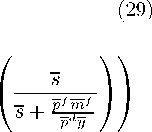which allows us to rewrite the Phillips curve as,
πb
βα ʌd I ω ʌd I
ɪ Etbt+1 + λbt-1 +
(1 — ω)(1 — α)(1 — αβ)
(1 + (ψ — 1)θ)λ
w
(w + pf f amY)
∖ P ∖ aNJ J
(Wct — pbtd) +
pf fwf am)ρ
P ∖ aN j
pf (ffam)ɔ
P ∖ aN J )
(pf - pd) + (Ψ - 1)bt ).
(28)
Here we can see the impact of introducing open economy considerations to
the firm’s pricing problem. Firstly, marginal costs largely reflect labour costs,
Wt — pbtd , as they do in the closed economy case. However, the weight on labour
costs in the marginal cost term reflects the steady-state share of labour costs in
total variable costs (labour plus intermediate goods) which, in turn, depends on
the substitutability of these two factors. Additionally, the costs of intermediate
goods relative to domestic prices, pbtf — pbtd , also affects the marginal costs of
production. Finally, the level of output at the individual firm level also affects
marginal costs, due to decreasing marginal returns in the two factors which are
variable in the short-run. This effect is captured in the term (ψ — 1)yet. However,
here yet refers to average firm output and not GDP due to the use of interme-
diate goods in production, which means we need to examine the link between
average firm output and GDP. We also wish to consider the link between the
open economy definition of marginal cost and the labour share proxy commonly
considered in the closed economy estimations of the NKPC to facilitate compar-
ison with existing studies. This is done in Appendix I, where the open economy
NKPC is shown to be,
πt
βα m ⅛d . ωʌd . (1 - ω)(1 - α)(1 - αβ)
λ tπ t+1 + λπt-1 (1 + (ψ — 1)θ)λ
-(ψ — 1)
pf mf
pdy
1 + (1 — ψ) ppmf
ybt
(1
/ pfmf
— ρ) --pdy--
ρ) « + pfmf
∖ pdy
+ρ
pfmf
pdy
1 + (1 — ψ) ppdmf

p pf mf ∖
(Wt — pf) + -------pdy -f-f I (pd — pf)).
t ∖1 + (1 — ψ) fmf)
where
sbt = Wct — Pbt + Nbt — ybt — (1 — χ)(pbtd — pbtf) (30)
is the labour share variable5 . The terms of trade effects entering from the
substitutability between home and foreign goods in consumption is actually
5By substituting the definition of consumer prices (2) into this definition, the labour share
variable can be rewritten as sbt = Wt + Nbt - pbtd - ybt which does not include the parameter χ
More intriguing information
1. Comparison of Optimal Control Solutions in a Labor Market Model2. ¿Por qué se privatizan servicios en los municipios (pequeños)? Evidencia empírica sobre residuos sólidos y agua.
3. The name is absent
4. Heavy Hero or Digital Dummy: multimodal player-avatar relations in FINAL FANTASY 7
5. The name is absent
6. The name is absent
7. IMMIGRATION AND AGRICULTURAL LABOR POLICIES
8. Education Research Gender, Education and Development - A Partially Annotated and Selective Bibliography
9. Output Effects of Agri-environmental Programs of the EU
10. The open method of co-ordination: Some remarks regarding old-age security within an enlarged European Union